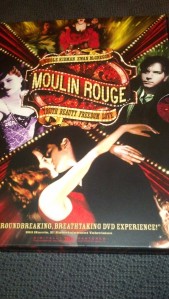The Task: Watch and write about every movie on my shelf, in order (Blu-rays are sorted after DVDs), by June 10, 2015. Remaining movies: 164 Days to go: 158
Movie #219: Rabbit Hole
God, I love this movie. Rabbit Hole might honestly be one of my all-time favorite films, and that’s not a distinction I make lightly. In fact, I usually refuse to make such a distinction at all since I love so many films for so many different reasons. And yet, if it hadn’t been for Nicole Kidman’s Best Actress nomination for her performance as Becca, I probably never would’ve seen it. Rabbit Hole was a small film, barely distributed, barely marketed — especially not in smaller cities — but an Oscar nomination bears a certain distinction. I don’t have the resources — or lately the time — to attempt an Oscar Death Race, but I do take pains to see all the nominated films in major categories (Best Picture, Best Director, plus all the acting and screenplay categories), and that’s how Rabbit Hole and I came to be acquainted.
The story is of Becca and her husband Howie (Aaron Eckhart), who have suffered the unbearable tragedy of losing their four-year-old son. What I love most about the film, though, is how it handles that tragedy. Namely, it doesn’t exploit it, it doesn’t play up the maudlin nature of the tale, it doesn’t even show it. No, it plops the audience down right in the middle of these people’s fully formed lives eight months after the fact and lets them figure out for themselves, over the course of the film through pacing and dialogue, what exactly happened and how these two are coping. There’s no exposition, no ham-handed delivery, no shoe-horned revelations. When Becca’s sister Izzy (Tammy Blanchard) reveals she found out she was pregnant a few weeks ago and Becca asks why she didn’t tell her sooner, Izzy’s response is a familiar “You know why.” Nothing else needs to be said between the sisters, so nothing else is.
Everyone speaks in coded language, particular to these people and this situation, giving the audience the feel of being immersed into real lives in progress. It’s one of the most authentic and organic atmospheres I’ve ever experienced from a film. Even the reveal of how, exactly, their little boy died occurs within a well-worn argument, clearly traversed several times before, both vocally and as part of each individual’s internal monologue. External conflicts and difficulties are alluded to but not over-explained. And the trials of both Becca and Howie are made visible — almost tangible — rather than verbalized.
Rabbit Hole is the story of two parents who lost their child and who are struggling in different ways with their mourning. One wants to withdraw, to never discuss it, to never allow the pain to take over because it does her no good. The other wants to feel, wants to remember, wants to share his grief with his wife and let it wash over them both. As a result, they find a widening distance between them, despite their clear and obvious love, contentment and comfort level with one another. (Their intimacy and camaraderie — despite tension — is perhaps never more obvious than when Becca accuses Howie of trying to rope her into sex. He denies it, saying he was just playing some music. She responds, incredulous, “Al Green isn’t roping?! Al Green!?”) Becca was a mother and wants to take care of people. She cooks and provides and tries to mother her sister and resents the companionship and outreach of her mother (Dianne Wiest). She finds herself drawn to and ultimately connecting with Jason (Miles Teller), the boy who shares in her tragedy from another angle — similar, but not the same, with guilt that is just as debilitating, just as haunting, just as pointless and nonsensical, as Becca’s own. Howie, on the other hand, finds solace in socializing, in commiserating. He wants a connection with his wife, but since his wife is emotionally unavailable, he finds himself drawn to and connecting with a woman named Gabby from their grief support group (Sandra Oh). He loves his wife, though, and I love that the movie doesn’t take the easy route of infidelity, so often used to exhibit marital strife and dissatisfaction. He recognizes the internal struggle he is having, and the cause for it, and he rebuffs the idea of Gabby because, well, she’s not Becca.
The other aspect of Rabbit Hole I love so much is the origin of the title — a comic book Jason writes and illustrates about a boy whose scientist father discovers these portals to alternate universes. Then the father dies, and the boy goes through all these portals to find his father, only his father is dead, so it isn’t the same. Becca reads the comic and it gives her comfort and closure in a way that support groups and religion can’t. It gives her the idea that somewhere her son is alive, that “this is just the sad version of us,” that “somewhere out there I’m having a good time.”
The movie, it turns out, is about how life, whether you like it or not, goes on, and figuring out how to do that. It ends with Becca and Howie talking, making plans for the future — not years away, but weeks: a barbecue — and just going through the little steps, day by day, that will get them through the next thing and the next and the next. And that’s how they’ll go from now on. Really, that’s how we all go on.



